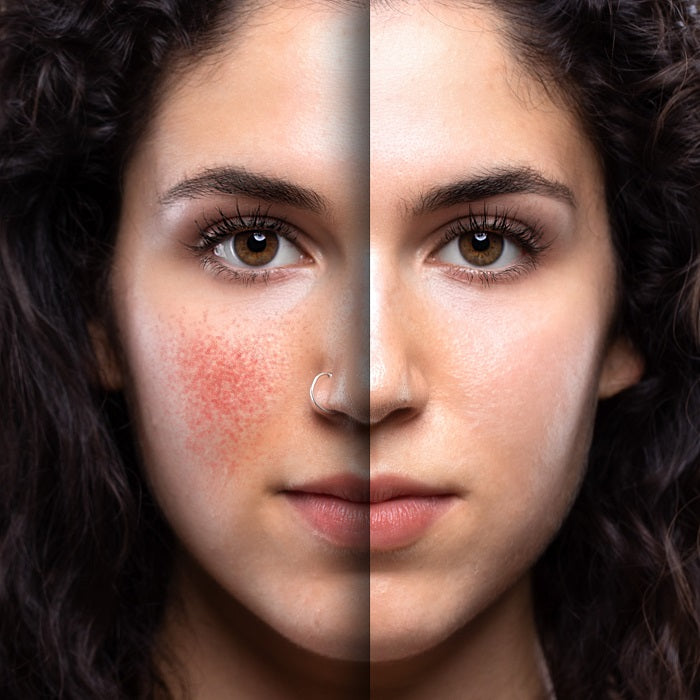
Rosacea Awareness Month: Skincare Superheroes for Your Redness and Flare-Ups
Share
Welcome to our guide for Rosacea Awareness Month, observed in April every year! Rosacea affects millions of people worldwide and can be a difficult condition to manage, but with the right knowledge and approach, you can keep it under control. In this guide, we'll provide you with essential information and tips for managing your rosacea and improving your overall skin health.
What is Rosacea?

Rosacea is a common chronic skin condition that affects over 16 million Americans. It typically appears on the face, causing redness, visible blood vessels, and sometimes acne-like breakouts. Rosacea is often mistaken for acne or eczema, but it has its own unique set of symptoms and triggers. There are several subtypes of rosacea, including erythematotelangiectatic, papulopustular, phymatous, and ocular. Although the exact cause of rosacea is unknown, it is believed to be related to genetics and environmental factors. Understanding the symptoms and triggers of rosacea is essential for managing this condition effectively.
Common Triggers of Rosacea Flare-Ups
Rosacea flare-ups can be unpredictable and frustrating, but identifying common triggers can help you manage your symptoms. Here are some of the most common triggers of rosacea flare-ups:
1. Sun exposure
Spending time in the sun without protection can cause redness and inflammation.
2. Weather changes
Extreme temperatures, wind, and humidity can all trigger rosacea flare-ups.
3. Stress
Stress and anxiety can cause a variety of physical symptoms, including rosacea flare-ups.
4. Alcohol
Alcohol consumption can cause flushing and redness in people with rosacea.
5. Spicy foods
Spicy foods can dilate blood vessels and trigger flushing in people with rosacea.
6. Hot drinks
Hot beverages, such as coffee and tea, can cause flushing and redness.
7. Certain medications
Some medications, including blood pressure medications and steroids, can trigger rosacea flare-ups.
8. Skincare and cosmetics
Harsh chemicals, fragrances, and exfoliants can irritate the skin and trigger rosacea flare-ups.
Skincare Superheroes for Rosacea
When it comes to managing rosacea, a consistent and gentle skincare routine is key. Here are some skincare superheroes that can help calm redness and soothe flare-ups:
Gentle cleansers
Look for fragrance-free, non-foaming cleansers that are formulated for sensitive skin. Avoid scrubbing or using hot water, as this can irritate the skin.
Moisturizers
Choose a moisturizer that is non-comedogenic and free of fragrance and harsh chemicals. Look for ingredients like ceramides and hyaluronic acid, which can help hydrate and soothe the skin.
Sunscreen
Protecting your skin from the sun is essential for managing rosacea. Look for a broad-spectrum sunscreen with an SPF of at least 30, such as EltaMD UV Clear Tinted Broad-Spectrum SPF 46 or EltaMD UV Clear Broad-Spectrum SPF 46 Facial Sunscreen, and reapply every two hours.
PCA SKIN Anti-Redness Serum
This serum is specially formulated to target redness and inflammation in people with rosacea. It contains niacinamide, azelaic acid, and caffeine to calm the skin and reduce redness.
Green-tinted makeup
A green-tinted primer or concealer can help neutralize redness and even out skin tone.
In addition to these skincare superheroes, it's important to be gentle with your skin and avoid harsh products and treatments. Stick to a simple, consistent routine and be patient - managing rosacea takes time and effort, but it is possible.
Other Skincare Tips for Managing Rosacea

In addition to using gentle skincare products and identifying your triggers, there are several other tips that can help you manage your rosacea symptoms:
Be mindful of your diet
In addition to spicy foods and alcohol, certain foods like dairy and chocolate can also trigger rosacea flare-ups. Pay attention to what you eat and how it affects your skin.
Stay cool
Avoid hot showers and saunas, as heat can trigger flushing and redness.
Avoid harsh chemicals
Harsh chemicals like sulfates, alcohol, and fragrance can irritate the skin and make rosacea worse. Stick to gentle, fragrance-free products.
Be gentle with your skin
Avoid rubbing or scrubbing your skin, and be gentle when applying skincare products.
Use a humidifier
Dry air can exacerbate rosacea symptoms, so using a humidifier can help keep your skin hydrated.
Manage stress
Stress and anxiety can trigger rosacea flare-ups, so it's important to manage your stress levels. Exercise, deep breathing, and meditation are all great ways to reduce stress.
By incorporating these tips into your daily routine, you can help manage your rosacea symptoms and improve the overall health of your skin. Remember, everyone's skin is different, so it's important to find what works for you and stick with it.
Self-Care Tips for Managing Rosacea
In addition to skincare and lifestyle changes, self-care practices can also help manage rosacea symptoms. Here are some self-care tips to consider:
Take care of your mental health
Managing a chronic skin condition can be stressful, so it's important to take care of your mental health. Consider seeing a therapist or joining a support group to connect with others who are going through similar experiences.
Practice relaxation techniques
Relaxation techniques like yoga, deep breathing, and meditation can help reduce stress and promote relaxation.
Get enough sleep
Getting enough sleep is important for overall health, including the health of your skin. Aim for 7-8 hours of sleep per night.
Stay hydrated
Drinking enough water can help keep your skin hydrated and healthy. Aim for at least 8 glasses of water per day.
Exercise
Exercise can help reduce stress and improve overall health. Just be sure to avoid exercises that can trigger flushing and redness, such as high-intensity workouts.
Pamper yourself
Taking time to pamper yourself can help boost your mood and reduce stress. Consider getting a massage, taking a bath, or treating yourself to a favorite activity.
Remember, self-care is an important part of managing any chronic condition. By taking care of your physical and mental health, you can improve your overall well-being and reduce the impact of rosacea on your daily life.
Conclusion
Rosacea can be a challenging condition to manage, but with the right skincare and lifestyle changes, it's possible to keep symptoms under control. By identifying your triggers, using gentle skincare products, and practicing self-care, you can reduce redness and flare-ups and improve the overall health of your skin. Remember, everyone's skin is different, so it may take some trial and error to find what works best for you. Don't be afraid to seek professional help if you need it, and keep experimenting until you find a routine that works for you.
